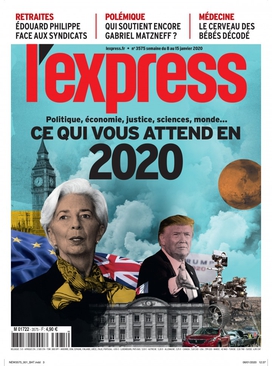L'Express facts for kids

L'Express magazine cover, 8–15 January 2020
|
|
| Editor-in-Chief | Arnaud Bouillin |
|---|---|
| Categories | News magazine |
| Frequency | Weekly |
| Circulation | 215,093 (total, 2022) |
| Founder | Jean-Jacques Servan-Schreiber and Françoise Giroud |
| Founded | 1953 |
| Company | Groupe L'Express (Alain Weill) |
| Country | France |
| Based in | Paris |
| Language | French |
| ISSN | 0014-5270 (print) 2491-4282 (web) |
L'Express is a French weekly news magazine based in Paris. It's like a newspaper, but it comes out once a week. The magazine is seen as being in the centre-right of French media. This means it often supports ideas that are a bit more traditional or focused on individual freedom. L'Express also has special sections, like L'Express Styles for lifestyle and Réussir for jobs.
The magazine was started in 1953 by Jean-Jacques Servan-Schreiber and Françoise Giroud. Many people think L'Express was the first French magazine to be like the big news magazines in the United States. It is one of the three main French news weeklies, along with Le Nouvel Obs and Le Point.
Contents
The Story of L'Express
How it Started
L'Express was created in 1953 by Jean-Jacques Servan-Schreiber and Françoise Giroud. Jean-Jacques Servan-Schreiber later became a leader in a political party. Françoise Giroud had worked for Elle magazine before. She later became France's first minister for women's affairs in 1974. She was also a minister of culture in 1976.
The very first issue of L'Express came out on May 16, 1953. This was around the end of the First Indochina War. It was also just before the Algerian War began. At first, L'Express was a special section added to the newspaper Les Échos.
Early Years and Challenges
In its early days, the magazine supported the ideas of Pierre Mendès-France. He was a French politician. L'Express generally had a left-of-centre view. This means it often supported ideas about social fairness and change. The magazine was against the Algerian War. It especially spoke out against the use of torture during the war.
In March 1958, the French government stopped L'Express from being published. This happened because of an article by Jean-Paul Sartre. To be able to print again, L'Express had to remove the article. François Mauriac, a famous writer, used to write a regular column for the magazine. But he left when Charles De Gaulle became president again.
Changes and Growth
In 1964, L'Express started to be designed like the US magazine Time and the German magazine Der Spiegel. Around that time, some journalists left L'Express. They started a new magazine called Le Nouvel Observateur.
Jean-Jacques Servan-Schreiber then made L'Express less focused on politics. This change helped the magazine grow a lot. Its sales went from 150,000 copies to 500,000 copies in just three years. In 1965, the magazine's sales increased even more. This was after it investigated the Ben Barka case. This case caused big problems for the government at the time.
New Owners and Direction
In 1971, nine journalists left L'Express. They felt that Servan-Schreiber's political activities were influencing the magazine too much. These journalists started a new magazine called Le Point. In 1977, Servan-Schreiber sold L'Express to Jimmy Goldsmith.
Later, in 1986, L'Express started working with Le Vif/L’Express. This is a French-language news magazine from Belgium. In 1987, L'Express sold 555,000 copies. In 1988, it sold 554,000 copies. That same year, the magazine was sold to C. G. E.
Over the years, L'Express changed owners several times. In 2002, it was sold to Socpresse. From 2003 to 2004, the magazine sold about 548,195 copies. In 2006, it was bought by Roularta Media Group. The magazine sold 547,000 copies that year.
Modern Era
In 2014, a billionaire named Patrick Drahi bought L'Express. The magazine faced some challenges, especially during the COVID-19 pandemic. In 2020, Alain Weill took over most of the magazine. He wanted to make L'Express like The Economist magazine.
Weill decided to focus L'Express on four main topics:
- International news
- Economics (how money and businesses work)
- Politics
- New ideas
New writers joined the magazine. They included experts in European news, social issues, and climate change. Weill also decided to remove entertainment news. He wanted the magazine to focus on readers like lawyers, business people, physicians, teachers, and students.
In 2021, about 65 to 67 journalists worked for L'Express. The magazine is still published every week.
People Who Worked at L'Express
Journalists
- Raymond Aron
- Christophe Barbier
- Albert Camus
- Madeleine Chapsal
- Michèle Cotta
- Franz-Olivier Giesbert
- André Gorz
- Danièle Heymann
- Jean-François Kahn
- Christian Makarian
- François Mauriac
- Catherine Nay
- Jean-François Revel
Collaborators
- André Malraux
- Jean-Paul Sartre

